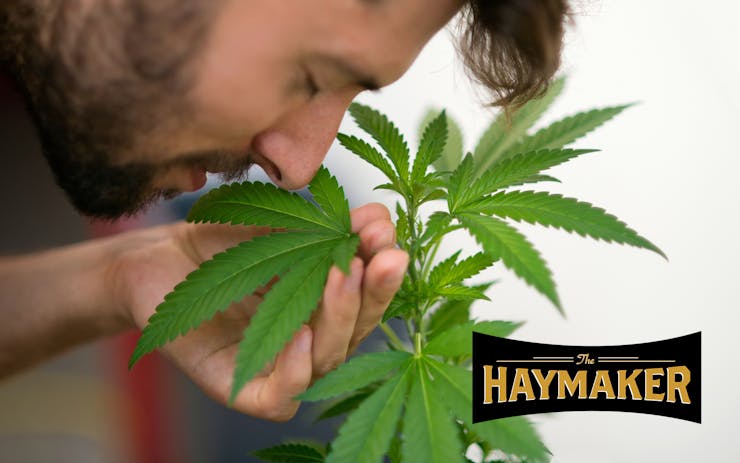‘The Haymaker’ is Leafly Deputy Editor Bruce Barcott’s weekly column on cannabis politics and culture.
To hear some disgruntled residents of Back Bay and Brighton tell it, Boston is starting to smell like one giant weed fart.
When you pass statewide legalization, a brief period of 'rational exuberance' will follow.'
On July 4, the Boston Globe ran a feature on the rising scent of cannabis around the city. “As surely as Boston’s rising glass towers are changing the city’s look,” wrote the Globe’s Beth Teitell, “marijuana smokers emboldened by the drug’s new legal status are altering the scentscape.”
Senior citizens are complaining to local pols about smelling it in the parks. Renters are griping to landlords about the funk filtering through the vents. A 9-year-old child asked her mother: “Why are there so many more skunks around?”
As a longtime Seattleite, I recognized the syndrome. After Washington state passed adult-use legalization in late 2012, the sidewalks of Pioneer Square seemed to bloom with plumes of decarboxylated dankness. Formerly closeted cannabis connoisseurs celebrated their new freedom with gusto.
And you know what happened next? Listen up, Boston: Everything calmed down.
After six months of (illegal) public puffing, most of Seattle’s cannabis consumers drew their usage back within the legal limits. The city’s funkfest subsided. I don’t think they did it simply to avoid a ticket, which at first was a measly $27. I think they did it because they realized discretion was simply part of being a considerate citizen of Seattle.
Boston is smelling what Seattle was cooking back in 2013. When you pass statewide adult-use legalization, as Massachusetts did last November, there follows a brief period of… well, let’s call it “rational exuberance.”
The Aroma of My Home-a
The scent strife in Boston is a reminder that the olfactory nerve is a strange and powerful transmitter. Its ability to trigger memory and emotion is unmatched by any other sensory mechanism.
I grew up in a town—Everett, WA—where we all received a daily allotment of sulphurous stench, courtesy of the Scott pulp and paper mill down on the waterfront. “The smell of money,” the grownups used to call it. By which they really meant, “the smell of solid union-wage jobs.”
Whenever I drive past one of the few remaining pulp mills around Puget Sound, it only takes the slightest whiff to trigger a brainstorm of Everett memories. Believe me, eau de pulp is not a scent Paco Rabanne is going to bottle and sell. But to me it’s exquisitely pleasant; it’s the smell of 1970s Everett, the JK Gill store, and Grandpa Barcott’s fishing boat.
Time Will Change the Scent
Today the smell of cannabis may trigger negative emotions in a lot of people around Boston. To old-timers it may be the smell of Vietnam-era conflicts, a country and culture ripped apart by peaceniks and hippies. To others it may smell like criminality and law-breaking.
Five years ago, I didn't want to smell it either. Now the aroma triggers a feeling of pride.
But give it time. Scent-triggered emotions can and do change.
In 2012, I was one of those cannabis-agnostic voters who didn’t want to smell the skunk on the street. Five years later, I find the occasional whiff to be a pleasant reminder of the progress my state has made. When I smell cannabis, the emotion triggered within me is pride.
Not everyone experienced the same transformation. In Eastern Washington, outdoor cannabis farmers are fighting for the right to grow, which has been challenged by neighbors who complain about the scent of ripening flower. To those neighbors, cannabis may remind them of the legalization measure they opposed.
To the children of today’s cannabis farmers, though, the smell of cannabis coming into bud will one day trigger wonderful memories of the family farm.
The Farmer’s 4:20
That’s not just a theory. I see it play out every week on the Facebook pages of Crystal and Kevin Oliver, cannabis farmers and proprietors of Washington’s Finest Cannabis. The Olivers grow in Spokane County, where they’ve been battling the smell issue for years now. They’re two of the state’s more than 23,000 farmers, processors, and retailers for whom the scent of cannabis is the smell of a well-paying, full-time job.
Crystal Oliver wrote about “the other 4:20” recently—4:20 in the morning, when cannabis farmers like herself are up and working in fields that smell like food on the table and orthodontia for the kids:
Destigmatizing the Scent
Back in Boston, not everyone is grumbling about the smell. To her credit, Beth Teitell’s Globe piece wasn’t just a litany of complaint:
Cannabis, it seems, may be joining Greater Boston’s roster of iconic smells, both those still with us (sausages sizzling outside of Fenway Park, Lynn beach at low tide, the weird smell emanating from the Downtown Crossing T entrance) and those that live on in olfactory memory (the Baker Chocolate factory in Lower Mills, Buzzy’s Roast Beef after the bars closed).
As more and more Americans turn to medical marijuana for relief from a wide range of ailments, the stigma of the scent is changing into a soothing balm. “If your grandmother has cancer and is prescribed medical marijuana,” an expert in scent design and marketing told Teitell, “you may come to associate the smell with her.”
So breathe deeply, Boston. You may think it smells like stoners and skunk today. A few years from now I’m betting you’ll catch a whiff and think of jobs and freedom. Maybe it’s not a coincidence that the Globe published that feature on the day we celebrate American freedom, justice, and liberty.






